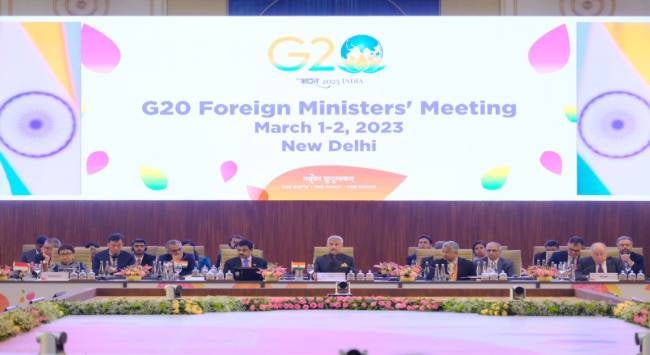Summary
The refusal of Russia and China to support a consensus statement at the G20 foreign ministers meeting in New Delhi, India, in early March 2023 underlined India’s growing diplomatic challenge in salvaging the G20 process amidst the deepening conflict in Ukraine. Despite the sharp differences within G20 on the war in Ukraine, New Delhi is hopeful that it can continue to push the agenda of the ‘Global South’ at the world’s premier multilateral forum. Meanwhile, the sharpening of great power rivalry is also persuading India to recalibrate its position on Ukraine away from Russia.
The failure of the G20 foreign ministers, gathered in New Delhi, India, on 1 and 2 March 2023, to agree on a final statement was not a surprise. Given the terribly polarised world environment today amid the continuing brutal war in Ukraine, the expectations from the G20 meeting were not too high. Yet, the fact that the foreign ministers could not agree to reiterate a formulation on Ukraine that they had articulated at the summit of the G20 in Bali, Indonesia, last November underlines the deterioration of great power conflict and the mounting crisis in multilateralism.
The principal reason for the diplomatic failure at New Delhi was the decision by Russia to walk away from the Bali consensus and China’s decision to support it. In New Delhi, Russia’s Foreign Minister Sergey Lavrov was frank enough to state that the Bali formula was a “thing of the past”. He said, “the Bali summit took place months ago and since then a lot of things have happened…and lot of things became clearer, not only to us but to all those who want to investigate what’s going on in Ukraine.”
During the Bali summit, Moscow’s aggression against Ukraine was in disarray as it quickly lost ground in the areas that it had seized in the initial weeks of the campaign. Russia has now built solid defensive lines in eastern Ukraine to prevent further losses. It has also reorganised its military command and strategy, mobilised many additional troops, and has launched a new military offensive. Moscow also has successfully strengthened its strategic partnership with Beijing.
Russian President Vladimir Putin appears confident that time is on his side and that a prolonged war would exhaust Ukraine, divide the West and allow Moscow to prevail, if at a massive cost to Russia. Meanwhile, United States (US) President Joe Biden has reaffirmed that the US and the West will stand by Ukraine for “as long as it takes”.
While Russia and China distanced themselves from the Chair’s summary issued by India, the Western powers strongly supported the outcome document. Speaking to the media after the meeting, US Secretary of State Antony Blinken said, “The Chair’s statement by India today reaffirmed the declaration issued by the G20 leaders last year in Bali, which ‘strongly condemned the war in Ukraine and stressed that it is causing immense human suffering and exacerbating existing fragilities in the global economy’”.
Blinken, who underlined that 18 members of the G20, supported the Chair’s summary, might be pleased with the isolation of Russia and China; but India which has sought to carefully navigate the conflict between Russia and the West over Ukraine now faces a challenging situation.
India played a major role during the Bali Summit to produce a consensus statement among the leaders that all sides could live with. But the room for compromise appeared to evaporate in the last few weeks. The first signs of the new diplomatic difficulty for India came out of the meeting of the G20 finance ministers in Bengaluru in late February 2023.
The diplomatic room for New Delhi, which led the effort in Bali to produce a consensus that all sides could live with, had clearly shrunk in the last few weeks. India, responsible for leading the G20 at this difficult juncture, is not ready to throw in the towel. It is confident that there is much time before the G20 leaders arrive in New Delhi for the September 2023 summit. If the ground situation has altered in the few weeks since the Bali summit and led to a dissipation of the consensus, there is no reason to believe the current dynamic situation in Ukraine will remain unchanged in the next few months.
India’s Prime Minister Narendra Modi, who addressed the G20 foreign ministers, was realistic enough to recognise the profound crisis in multilateralism today and point to its many failures. At the same time, though, Modi underlined India’s twin ambitions – to continue the campaign to reform multilateralism and to get the world to take greater cognisance of the challenges faced by the ‘Global South’.
Acknowledging the difficulties in producing a consensus on Ukraine, India’s External Affairs Minister Subrahmanyam Jaishankar pointed to the agreement among the foreign ministers on several issues of interest to India and the developing world. These included food and energy security, cooperation to counter terrorism, climate change, global health and disaster management. India is right to stay positive and remain committed to making the G20 summit in September 2023 a success.
Meanwhile, as the great power conflict sharpens, New Delhi appears to be recalibrating its position on the Ukraine conflict. During the Quadrilateral Security Dialogue (Quad) foreign ministerial meeting that followed the G20 ) foreign ministers meeting, Jaishankar joined his colleagues from Australia, Japan and the US to criticise the expansionist policies of both China and Russia. This is the first time that India agreed to join the Quad partners in opposing Russia’s invasion of Ukraine.
. . . . .
Professor C Raja Mohan is a Visiting Research Professor at the Institute of South Asian Studies (ISAS), an autonomous research institute in the National University of Singapore (NUS). He can be contacted at crmohan@nus.edu.sg. The author bears full responsibility for the facts cited and opinions expressed in this paper.
Pic Credit: MoFa Indonesia Twitter Account
-
 More From :
More From :
-
 Tags :
Tags :
-
 Download PDF
Download PDF



